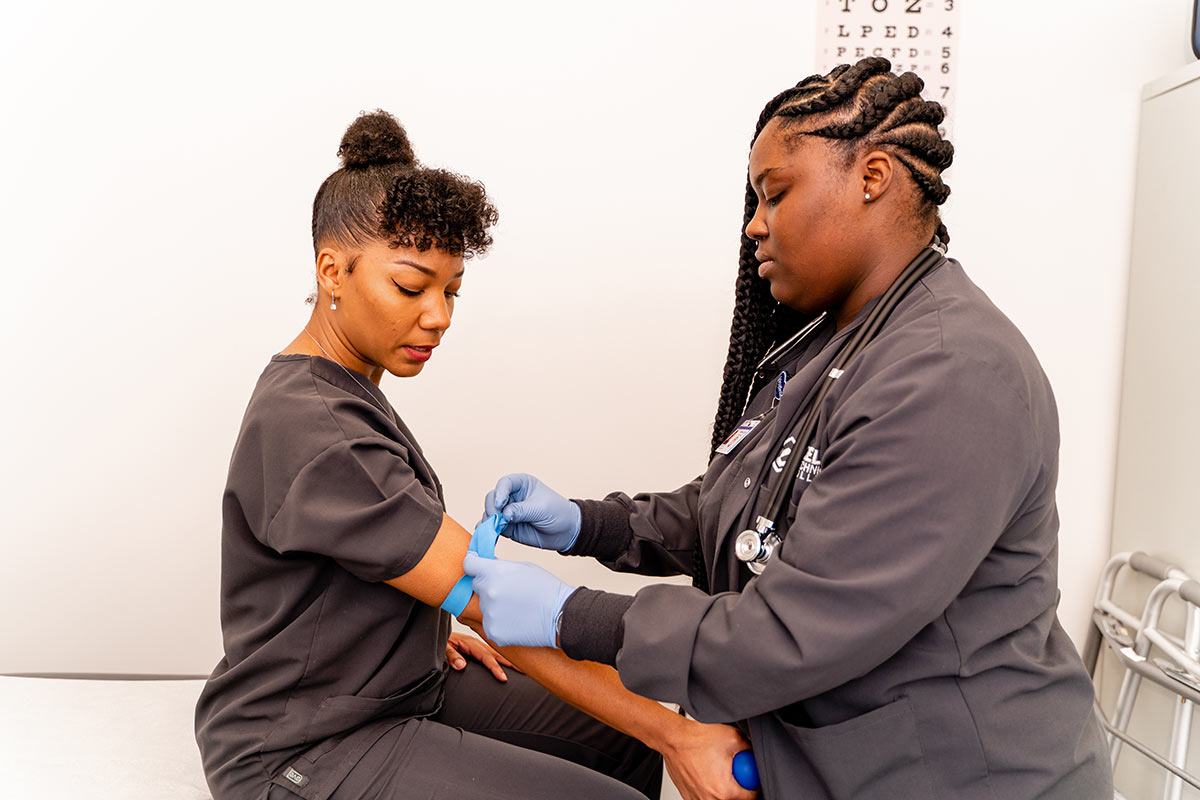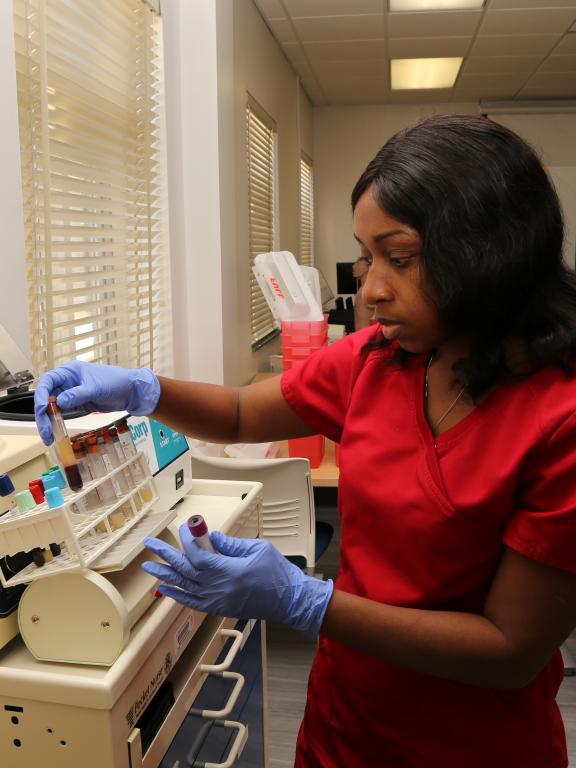Top Topics You Should Understand Before Enrolling in a Phlebotomy Training Course
Top Topics You Should Understand Before Enrolling in a Phlebotomy Training Course
Blog Article
The Path to Qualification: Comprehending the Phlebotomy Educating Training Course Journey and Its Value
As you take into consideration the path to qualification in phlebotomy, it is essential to recognize the role you'll play in healthcare. Your training will certainly cover vital skills, from blood collection strategies to patient interaction. Each element of the program prepares you for the obstacles in advance. What exactly does the trip involve, and why is qualification so vital for your future profession? Let's discover these inquiries better.

The Duty of Phlebotomists in Medical Care
Phlebotomists play a crucial role in the health care system, serving as the important link between individuals and important diagnostic testing. You'll execute blood attracts, making certain examples are collected accurately and securely. Your competence assists in diagnosing medical conditions, keeping track of wellness, and leading treatment decisions.
In your daily communications, you'll require to establish trust with clients, making them feel comfy during what could be a stressful experience. You are accountable for labeling and dealing with samples thoroughly to prevent contamination or mistakes, which can affect examination outcomes.
Past this, you'll typically work alongside doctors and nurses, interacting critical details concerning people' conditions. By grasping your abilities, you add meaningfully to client care, making you a crucial part of the medical group.
Summary of Phlebotomy Training Programs
When exploring phlebotomy training programs, you'll locate various kinds designed to fit different timetables and learning styles. Each program assists you create important abilities like blood collection and individual interaction. Recognizing these options is essential to picking the right path for your occupation.
Kinds Of Educating Programs
A number of kinds of training programs are available for those wanting to end up being skilled in phlebotomy. You can pick from certificate programs, which usually last a couple of months and concentrate on vital skills. There are also diploma programs that offer a more comprehensive education, usually lasting approximately a year. If you're searching for a deeper understanding, an associate level in a relevant area may be the appropriate fit. On-line training courses use adaptability for those stabilizing work or family members dedications, allowing you to examine at your own rate. Additionally, some hospitals and facilities offer on-the-job training programs, supplying useful experience while you learn. Whatever path you select, each program aims to furnish you with the necessary abilities for a successful phlebotomy job.

Key Abilities Created
Understanding phlebotomy needs a collection of essential abilities that are created through comprehensive training programs. You'll find out technical skills like proper capillary choice, needle insertion, and blood collection techniques. These hands-on techniques assure you can perform procedures safely and efficiently. Furthermore, communication skills are fundamental; you'll need to engage with patients, clarify treatments, and placed them at simplicity. Recognizing makeup and physiology is important, as well, as it assists you find capillaries and understand the body's action to blood attracts. Ultimately, you'll gain understanding of safety and security protocols and infection control, guaranteeing you keep a clean and sterile setting. Each of these abilities is important for your success as a qualified phlebotomist, making you an important possession in any type of medical care setup.
Trick Components of a Phlebotomy Course
In a phlebotomy program, you'll concentrate on essential subjects that lay the groundwork for your future profession. You'll take part in hands-on training that permits you to use what you've found out in real-world settings. Both the core educational program and functional experience are important for your success as a phlebotomist.
Core Curriculum Introduction
While pursuing a phlebotomy training program, you'll experience a curriculum created to equip you with fundamental abilities and understanding. Phlebotomy school. This educational program usually consists of anatomy and physiology, focusing on the blood circulation system and understanding blood elements. You'll additionally discover various types of blood collection approaches, consisting of venipuncture and capillary leak strategies
Additionally, infection control and safety and security protocols are vital elements, guaranteeing you recognize just how to maintain a sterile environment. You'll study patient interaction, stressing interaction and compassion, which are important for reducing person anxiety. Ultimately, honest and lawful considerations will be dealt with, preparing you for real-world responsibilities. This foundational knowledge will allow you to stand out as a phlebotomist and supply top quality treatment in clinical setups.
Hands-On Training Experience
Obtaining hands-on experience is a crucial component of your phlebotomy training course. This useful training allows you to use what you've learned in a real-world setup, improving your abilities and self-confidence. You'll exercise venipuncture strategies, learn how to deal with various kinds of samplings, and get aware of the equipment used in the field. Under the advice of knowledgeable teachers, you'll refine your abilities, guaranteeing you're gotten ready for any situation you could deal with.
Additionally, you'll obtain the possibility to communicate with clients, which is vital for establishing your interaction skills. This combination of technical efficiency and social abilities is critical for your success as a licensed phlebotomist. Eventually, hands-on training is where concept meets technique, strengthening your expertise and readiness for qualification.
Qualification and Licensing Demands
Prior to you can begin your occupation in phlebotomy, it is vital to understand the certification and licensing demands that differ by state. Many states need phlebotomists to hold a qualification from an acknowledged organization, such as the National Phlebotomy Organization or the American Culture for Scientific Pathology. These accreditations typically entail passing an examination that checks your understanding and abilities in the area.
Along with certification, some states have details licensing demands. You might need to complete a certain number of hours in scientific method, send proof of training, or undergo a history check. It is important to research your state's policies to make certain you fulfill all essential requirements.
Staying notified regarding these needs not just assists you secure a position but likewise improves your reliability as a professional. By satisfying these requirements, you'll be well on your means to a successful occupation in phlebotomy.
Hands-On Training and Practical Experience
Hands-on training and functional experience are essential elements of your phlebotomy education, as they enable you to use theoretical knowledge in real-world situations. Throughout your training, you'll participate in supervised venipuncture, find out appropriate methods, and end up being acquainted with numerous blood collection equipment. This direct participation is critical for building your confidence and sharpening your abilities.
You'll work closely with skilled professionals that can direct you with the nuances of individual communication and example handling. Each method session not just reinforces your understanding yet additionally prepares you for the fast-paced setting of healthcare setups.
Additionally, several programs incorporate scientific turnings, enabling you to experience diverse setups, from hospitals to outpatient centers. This exposure helps you adjust to different challenges and individual demands, ensuring you're well-prepared for your future function. Embrace these chances, as they're necessary to becoming an experienced and compassionate phlebotomist.
Difficulties Faced Throughout Training
While gaining hands-on experience is crucial, it is very important to identify the challenges that can emerge during your phlebotomy training. You may experience anxiousness when performing treatments on real people, particularly if you're new to the atmosphere. The pressure to obtain whatever right can be overwhelming. In addition, grasping the skills needed for blood draws takes method; you may have problem with strategy at first.
Time administration can likewise be a hurdle, as harmonizing theory, functional sessions, and individual commitments can feel intimidating. You might encounter differing learning paces among your peers, bring about feelings of insecurity if you think you're falling back. Adapting to the different individualities of instructors can be difficult, as each might have a special training style.
Recognizing these challenges early on can prepare you for success and aid you create resilience throughout your training trip.
Career Opportunities After Certification

As you obtain experience, you may even consider concentrating on areas like pediatric or geriatric phlebotomy, satisfying particular person requirements. Some phlebotomists pick to progress their occupations by coming to be laboratory technicians or going after more education and learning in healthcare areas.
In addition, your qualification can cause functions in training or supervising new phlebotomists, permitting you to share your understanding. Phlebotomy school With the health care sector constantly growing, your skills will certainly constantly remain in need, leading the way for a steady and meeting job. Accept the opportunities waiting on you!
Frequently Asked Inquiries
What Is the Common Period of a Phlebotomy Educating Course?
Phlebotomy training programs usually last around four to eight weeks. You'll take part in hands-on method, classroom instruction, and on-line understanding. Completing this training prepares you for qualification and a satisfying career in health care.
Are Online Phlebotomy Courses Available?
Yes, on-line phlebotomy courses are offered. They offer flexibility and benefit, enabling you to study at your very own speed. Simply confirm the program is certified to satisfy accreditation needs and obtain valuable skills for your career.
Just How Much Does Phlebotomy Training Typically Cost?
Phlebotomy training usually sets you back in between $700 and $2,500, relying on the program and area. You ought to consider elements like course size, consisted of materials, and hands-on experience when picking the appropriate training for you.
What Are Typical Prerequisites for Phlebotomy Training?
Typical requirements for phlebotomy training often include a secondary school diploma or GED, booster shots, and a background check. Some programs may additionally require basic medical care understanding or accreditations, guaranteeing you're gotten ready for hands-on training.
Can I Work While Finishing My Phlebotomy Training?
Yes, you can function while finishing your phlebotomy training. Numerous pupils balance work with their research studies, yet make specific to handle your time successfully to guarantee you fulfill both work and training commitments effectively.
Report this page